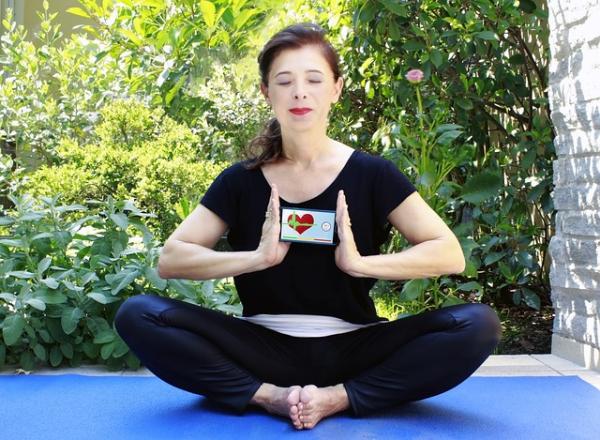The description of the accomplished multi-tasking warrior often competes with a similar story about distractions and an inability to focus; I suppose your narrative choice has to deal more with the subject in question, a mom trying to juggle work and children or a millennial idly interacting with their phone. Meditation, writ large, has been known to improve focus, but can be “challenging, intimidating and expensive to learn. …” A new study looks at an app, how surprising is that, delivering the same meditation benefit to those already enslaved (my word choice) to their phones.
The app, MediTrain, was developed by Neuroscape, a University of California, San Francisco incubation center who reports their findings in Nature Human Behavior. The app asks its users to concentrate on their breath for an initial interval, in the words of the lead author, “a really low dose, about 15 to 20 seconds.” [1] The user is then asked whether they were distracted during that time period; if not, the interval is increased by 10%; if they were distracted the interval is decreased by 20%. The app, through the algorithm, acted as a “meditation coach.”
Over a twenty-five-day period, participants increased that non-distracted interval to 6 minutes. They found evidence of improved focus, as measured by response times on tests of vigilance. They found changes in neuro markers, e.g., EEG activity and MRI imaging affecting the default mode network, brain areas that are felt to be altered by meditation based upon studies of meditation experts.
Unfortunately, the limitations of the research make this more proof of concept than a scientific study. The first limitation, the study is underpowered; requiring 30 participants in both the intervention and control arm. Due to equipment malfunctions, lack of compliance, there were about 20 participants in each group. Second, the control arm was defined as another app chosen based on the expectation that they would provide the same cognitive benefits as MediTrain – that they would be a placebo. [2] Leaving aside how they identified the apps, were they fair controls?
The participants in the control arm were asked to use three apps over 30 minutes. One was teaching a foreign language, the second teaching Tai Chi movements, and the third solving puzzles. Additionally, only the foreign language app could be timed, so that participants were asked to make sure they evenly divided the remaining time between the two other apps. How is all this shifting of attention, the multitasking requirement to perform the activity while still keeping track of the time being spent a reasonable control? The expectation that they would provide the same benefits is insufficient and makes all the reporting of the differences between MediTrain and “placebo,” to my mind, invalid.
The results suggest that the app can improve focus, at least for the week after training when the post-test studies were performed. I am biased. I meditate, and I find it helpful; I feel, that anything that increases participation in meditation is good. But this is scientism, not science. All the p-values and statistics in the world will not make an underpowered study significant, nor will it allow an apple to apple comparison, when the control group bears little relation to the interventional group.
[1] The use of the term dose is a needless medicalization. It makes more sense when you recognize that the lead and anchoring authors hold multiple positions with UCSF’s medical school and that the anchoring author is a co-founder of Akili, “a prescription digital medicine company combining scientific and clinical rigor with the ingenuity of the tech industry to reinvent medicine.” For the cynical amongst us, disclosure is made of the competing interests, along with the less than assuring phrase, “MediTrain and the apps used for the control conditions are not currently associated with Akili.”
[2] These apps were identified in a Mechanical Turk survey of about 300 individuals performed before this work.
Source: Closed-loop digital meditation improves sustained attention in young adults Nature Human Behavior DOI: 10.1038/s41562-019-0611-9




